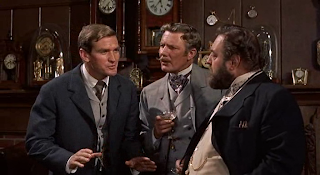Wise: Howdy, Werth.
Werth: Are you ready?
Wise: Ready? For an early spring at the farm market and an eagerly awaited pea and radish salad?
Werth: No, for the much-hyped birth of Disney's new sci-fi franchise, John Carter?
Wise: It's hard to tell from the cacophonous ad campaign, but John Carter is based on Edgar Rice Burroughs' classic sci-fi novel from 1917, A Princess of Mars, which has been cited by writers as diverse as Ray Bradbury and Junot Díaz as inspiration for their careers.
Werth: One of my favorite sci-fi franchises also started with a book. In 1963 author Pierre Boulle wrote a science fiction novel called, La planete des singes and in 1968, Hollywood released the movie version au anglais, Planet of the Apes.
Wise: Visions of a dystopian future just sound so much more alluring in French.
Werth: Planet of the Apes begins with a trio of astronauts led by George Taylor (an eternally biblical Charlton Heston) who awaken to find themselves crash-landed on an alien planet in the year 3978. But they are not alone. They quickly find themselves part of a pack of primitive, loincloth-covered humans being hunted by gun-toting apes on horseback.
Wise: I wonder if Heston's support of the Second Amendment extended to primates.
Werth: Probably not, because Taylor is shot in the throat and faints as he hears an ape tell his companions to "Smile," before their picture is snapped in front of their daily catch.
Taylor awakens again in a medical facility where he is the object of human study by chimp scientists Cornelius (Roddy McDowall) and Zera (Kim Hunter). Nicknaming him "Bright Eyes" the primate probers soon learn they have a very unique find and Taylor quickly takes advantage of them so he can make his escape—only to discover a shocking truth about this "alien" world.
Wise: I'd give a spoiler alert, but who doesn't already know about the ending?
Werth: From the oft-quoted "filthy apes" line to the cultural touchstone ending, Planet of the Apes is the perfect example of how good sci-fi transcends simple popcorn entertainment. Through unorthodox use of storytelling, classic sci-fi's like Invasion of the Body Snatchers (1956) and The Day the Earth Stood Still (1951) can communicate socially relevant themes not through overt soap-boxing, but by having it seep into our cultural consciousness under the guise of alien invaders or simian fascists.
Beneath the driving, tribal Jerry Goldsmith score and the amazing, Special Oscar-winning makeup of John Chambers is a clever depiction of the race issue in America and the inhumanity of nuclear proliferation. Spawning four sequels, a television series, an animated series, a Tim Burton re-make and a recent successful prequel, Planet of the Apes also proved that sci-fi was big business—long before Luke Skywalker looked out over the horizon of Tatooine.
Wise: The Time Machine (1960) is another classic sci-fi film that portrays future worlds while cleverly commenting on the present. Based on H.G. Wells' 1895 novella, it stars ruggedly handsome Rod Taylor as H. George Wells—
Werth: Rod's one man I'd like to squeeze into a time machine with...
Wise: —a ruggedly handsome Victorian inventor who attempts to convince his friends that he has been to the future—and survived.
Werth: I sometimes wonder how I survive when I'm in a horseless carriage with some chirpy girl on her cellphone.
Wise: Of course his friends are skeptical, and he launches into his tale, describing pending wars, natural catastrophes and women's hemlines reaching above the knee. These disasters buffet him far into the future, until finally he descends into the normal timeline in the year 802,701. He discovers that the world has become a paradise, filled with riotous flowers, bounteous fruits, and the Eloi, a race of gorgeous, golden humans with not much going on upstairs.
Werth: Add a drive-in movie theater and it sounds like heaven to me.
Wise: The only wrench in this prospective paradise is that the Eloi are occasionally harvested for dinner by the Morlocks, a subterranean breed of monstrous humanoids.
Werth: Subterranean humanoids spoil everything.
Wise: Of course, Taylor leaps into action, battles the Morlocks, rouses the Eloi from their stupor, and falls for the planet's prime sex kitten (Yvette Mimieux), only to be forced back to his present day where his dubious friends are waiting. Only the loyal Filby (a brogue-ing Alan Young rehearsing for his future career as Scrooge McDuck), believes him, and in frustration, Taylor decides to abandon his stultifying gentleman's life and goes back to the future for adventure.
Werth: I go Back to the Future for Crispin Glover.
Wise: Director George Pal did have plans for a sequel, but that never came to fruition. Instead, there have been multiple re-makes for both television and theaters, documentaries, fan fictions, and the entire steampunk movement. Still, the best way to enjoy this classic is with repeated viewings, returning again and again to Pal's charming (and Oscar-winning) stop motion special effects, Taylor's lantern-jawed sensitivity, and especially Russell Garcia's romantic, yet restrained, score.
Werth: Wow, Wise, we make the future sound so classic.
Wise: The only future I'm anticipating is next week's Film Gab.














No comments:
Post a Comment